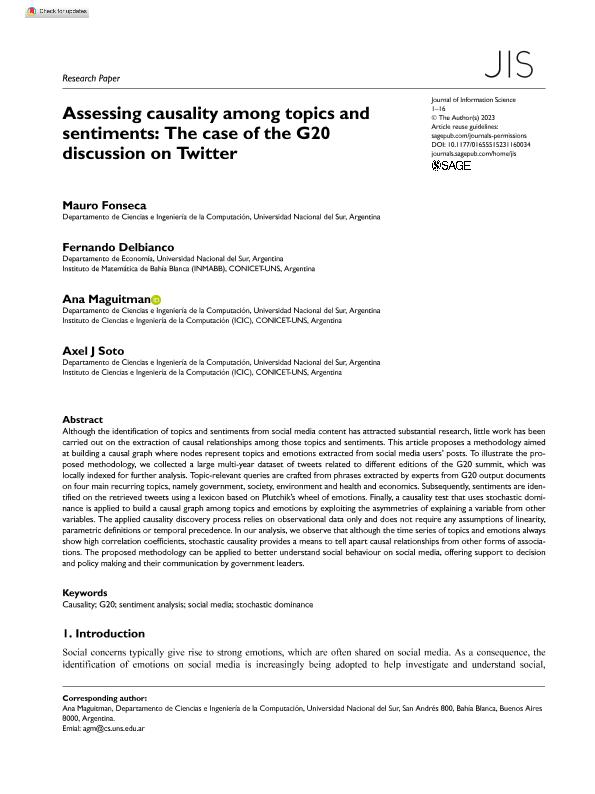Mostrar el registro sencillo del ítem
dc.contributor.author
Fonseca, Mauro
dc.contributor.author
Delbianco, Fernando Andrés

dc.contributor.author
Maguitman, Ana Gabriela

dc.contributor.author
Soto, Axel Juan

dc.date.available
2023-09-11T15:43:20Z
dc.date.issued
2023-03-30
dc.identifier.citation
Fonseca, Mauro; Delbianco, Fernando Andrés; Maguitman, Ana Gabriela; Soto, Axel Juan; Assessing causality among topics and sentiments: The case of the G20 discussion on Twitter; Sage Publications Ltd; Journal Of Information Science; 30-3-2023; 1-16
dc.identifier.issn
0165-5515
dc.identifier.uri
http://hdl.handle.net/11336/211125
dc.description.abstract
Although the identification of topics and sentiments from social media content has attracted substantial research, little work has been carried out on the extraction of causal relationships among those topics and sentiments. This article proposes a methodology aimed at building a causal graph where nodes represent topics and emotions extracted from social media users? posts. To illustrate the proposed methodology, we collected a large multi-year dataset of tweets related to different editions of the G20 summit, which was locally indexed for further analysis. Topic-relevant queries are crafted from phrases extracted by experts from G20 output documents on four main recurring topics, namely government, society, environment and health and economics. Subsequently, sentiments are identified on the retrieved tweets using a lexicon based on Plutchik?s wheel of emotions. Finally, a causality test that uses stochastic dominance is applied to build a causal graph among topics and emotions by exploiting the asymmetries of explaining a variable from other variables. The applied causality discovery process relies on observational data only and does not require any assumptions of linearity, parametric definitions or temporal precedence. In our analysis, we observe that although the time series of topics and emotions always show high correlation coefficients, stochastic causality provides a means to tell apart causal relationships from other forms of associations. The proposed methodology can be applied to better understand social behaviour on social media, offering support to decision and policy making and their communication by government leaders.
dc.format
application/pdf
dc.language.iso
eng
dc.publisher
Sage Publications Ltd

dc.rights
info:eu-repo/semantics/openAccess
dc.rights.uri
https://creativecommons.org/licenses/by-nc-sa/2.5/ar/
dc.subject
CASUALITY
dc.subject
G20
dc.subject
SENTIMENT ANALYSIS
dc.subject
SOCIAL MEDIA
dc.subject
STOCHASTIC DOMINACE
dc.subject.classification
Ciencias de la Computación

dc.subject.classification
Ciencias de la Computación e Información

dc.subject.classification
CIENCIAS NATURALES Y EXACTAS

dc.title
Assessing causality among topics and sentiments: The case of the G20 discussion on Twitter
dc.type
info:eu-repo/semantics/article
dc.type
info:ar-repo/semantics/artículo
dc.type
info:eu-repo/semantics/publishedVersion
dc.date.updated
2023-08-24T14:29:35Z
dc.identifier.eissn
1741-6485
dc.journal.pagination
1-16
dc.journal.pais
Reino Unido

dc.journal.ciudad
London
dc.description.fil
Fil: Fonseca, Mauro. Universidad Nacional del Sur. Departamento de Ciencias e Ingeniería de la Computación; Argentina
dc.description.fil
Fil: Delbianco, Fernando Andrés. Consejo Nacional de Investigaciones Científicas y Técnicas. Centro Científico Tecnológico Conicet - Bahía Blanca. Instituto de Matemática Bahía Blanca. Universidad Nacional del Sur. Departamento de Matemática. Instituto de Matemática Bahía Blanca; Argentina. Universidad Nacional del Sur. Departamento de Economía; Argentina
dc.description.fil
Fil: Maguitman, Ana Gabriela. Consejo Nacional de Investigaciones Científicas y Técnicas. Centro Científico Tecnológico Conicet - Bahía Blanca. Instituto de Ciencias e Ingeniería de la Computación. Universidad Nacional del Sur. Departamento de Ciencias e Ingeniería de la Computación. Instituto de Ciencias e Ingeniería de la Computación; Argentina
dc.description.fil
Fil: Soto, Axel Juan. Consejo Nacional de Investigaciones Científicas y Técnicas. Centro Científico Tecnológico Conicet - Bahía Blanca. Instituto de Ciencias e Ingeniería de la Computación. Universidad Nacional del Sur. Departamento de Ciencias e Ingeniería de la Computación. Instituto de Ciencias e Ingeniería de la Computación; Argentina
dc.journal.title
Journal Of Information Science

dc.relation.alternativeid
info:eu-repo/semantics/altIdentifier/url/https://journals.sagepub.com/doi/10.1177/01655515231160034
dc.relation.alternativeid
info:eu-repo/semantics/altIdentifier/doi/http://dx.doi.org/10.1177/01655515231160034
Archivos asociados
